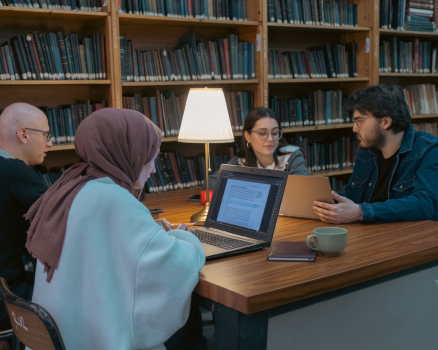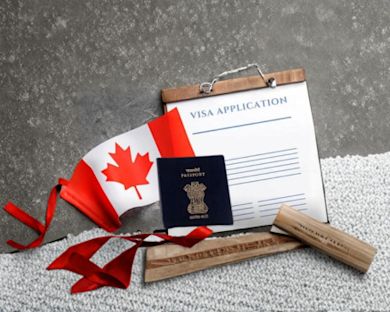Topics covered
- 5 min
- Published: 13 May 2025
- Updated: 12 May 2025
Aspiring to study abroad but not sure where to start? Let us help you. IDP Education is one of the finest study-abroad consultancies, placing students overseas for 55+ years. Every year, millions of students dream of pursuing higher education overseas for numerous reasons. However, most state that the process can be rather overwhelming. This is why this blog defines the clear steps on how to begin your research for studying abroad. Let’s get started.
Choose Your Preferred Countries
The first step in your study-abroad research is to finalise the country that you want to study in. The choice can be difficult to make; hence, some key factors to consider here include the cost of living in the country, its climate, the common language spoken, prospective job opportunities for graduates, student visa policies, and cultural compatibility.
Join the IDP student community
Connect with peers and student ambassadors to hear real experiences, tips, and advice about studying abroad.

Research Top Universities and Courses
Once you have the country in mind, the next step is to identify and analyse the top universities and courses available in that country for international students. You can look for the best universities to study abroad using online platforms, global ranking systems, and course portals. One of the best ways is to check out online student reviews or testimonials from the alumni. It helps provide a clear idea of the institution. You can also check out YouTube vlogs for more insights on the college.
Understand Admission Requirements
This is a crucial step in the university selection process abroad. Make sure to find the exact eligibility criteria that every university has for admitting international students. Check whether you meet those requirements and find out some additional criteria that you may need to meet to be considered eligible for admission. These include entrance exams, such as the GRE/GMAT, and English language proficiency tests like IELTS. Additionally, check for the documents that you may need to submit as part of the admission process.
Calculate Costs and Plan Your Budget
Financial planning is a crucial part of any study-abroad program. This is a critical step that must be carefully reviewed and all aspects considered before applying for admission to an international university. Make sure to check the common expenses involved in studying abroad, such as the tuition fee for the course, cost of accommodation, travel expenses, study visa fee, daily living costs, etc. Determining the average expected costs would help you plan your budget better.
Researching Scholarships and Financial Aid
Once you have planned your budget, it helps to identify the gaps in meeting the cost of studying overseas. The good news is that this gap can be filled by considering certain options for financial aid, such as scholarships. Several universities and governments abroad provide international students with various scholarships to help ease the financial load of pursuing higher education in their country. Make sure to check and review these options in your study-abroad research.
Learning About Student Visas and Legal Requirements
This is yet another important detail to factor into your research for studying overseas. Every country has its student visa requirements, and the visa application process differs for each of them. It is thus important to study the student visa process, the legal requirements for international students to study in a specific country, and the exact documents required. Also, make sure to begin your visa application process early, keeping sufficient time for visa processing and approval (before the start date of the course).
Connecting with Existing or Former International Students
It is a good idea to make room for this activity, too, in your study-abroad research. Connecting with students who are currently pursuing higher education abroad or have done so in the past helps you get a clearer picture of the ground reality of overseas learning. It is thus recommended to network with the existing students or past alumni of international universities to get first-hand information on studying in these institutions.
Staying Organised During the Research Process
This can be very helpful during your entire process of researching for studying overseas, and even help avoid feeling overwhelmed. Create a master plan or a spreadsheet to manage all your research findings. Make notes of the application deadlines for all universities researched so far, the important test dates, information on scholarships, and the required documents for every university. This would also help prevent missing out on any important details and ensure that you stay on track in your research.
Finalising the Plan and Application Checklist
This is the last and final stage in your study-abroad research process, where you conclude your research by narrowing down your choice and making a final decision on the university and course to opt for your higher education abroad. Once you have made your final choice, it’s time to start preparing for university applications. Make sure to stick to the deadlines and ensure accuracy throughout the study-abroad application process to avoid rejections.
Looking for Expert Guidance? IDP is Here to Assist You!
If the steps defined above seem too much to do, you can always seek professional support by turning to experts who have extensive experience in abroad education. IDP Education is one of the best-known study-abroad consultancies, which has been placing students abroad for over 55 years now.
From helping you choose the best country abroad to shortlisting the top universities and courses overseas, our experts help you at every stage, so you don’t have to do it all on your own. We help place students in the 6 best countries to study abroad - the USA, the UK, Canada, Ireland, Australia, and New Zealand.
FAQs for How Should I Start Research for Abroad Studies?
1. How to start studying abroad?
The first step to start your study-abroad research is to consider your academic interests and career goals. You can then look for preferred countries or courses to pursue and achieve those goals.
2. How do I choose the right country to study abroad?
Consider the cost of living in various countries, cultural compatibility, and the language spoken. Also, research the study abroad visa requirements and post-study work rights in the country.
3. What factors should influence my decision to study abroad?
Some of the key factors to help you decide whether studying abroad is a wise choice are:
Academic background and interests
Career objectives
Personal growth and development
Living costs
Quality of learning
Global networking
Cultural experiences
4. What are the key admission requirements for studying abroad?
The exact admission criteria would vary for different countries and institutions abroad. However, some of the common requirements for international students are:
Academic transcripts
Statement of Purpose (SOP)
Letter of Recommendation (LOR)
IELTS or similar English proficiency test scores
5. How can I compare study programs in different countries?
First, consider your preferred field of learning, the cost of the program, and the location of the university. Then, compare the key features of these programs on various online portals such as university websites and international ranking systems.
6. How do I estimate the total cost of studying abroad?
The total cost of studying abroad would include the tuition fee of the course you are considering to pursue, along with the cost of accommodation and other living expenses (daily and monthly).
7. What scholarships are available for studying abroad?
Various governments and universities offer scholarships to international students to encourage them to study abroad. These include the Gilman International Scholarship, Fulbright Program, and National Overseas Scholarship.
8. How can I find financial aid options for international studies?
You can research different options such as scholarships, study loans, grants, and programs sponsored by employers. You can explore these options on the official portals of various universities and governments.
One account for all your study abroad needs
Create your profile and unlock a wide array of features including personalised recommendations, fast-tracked applications and much more.











